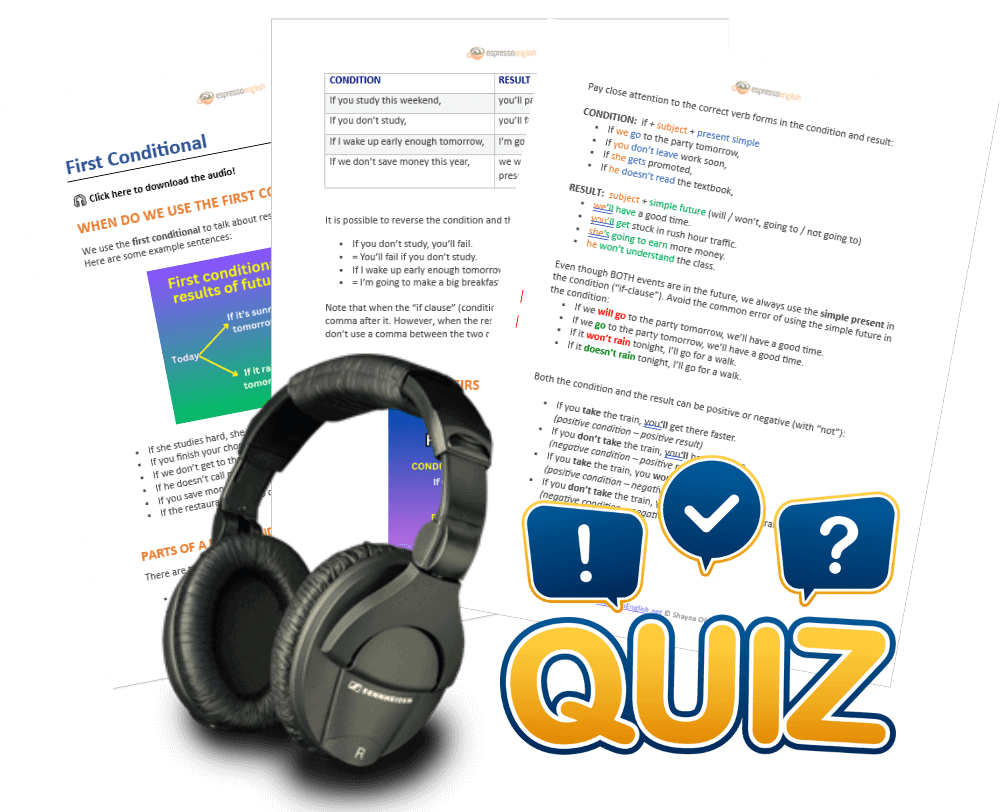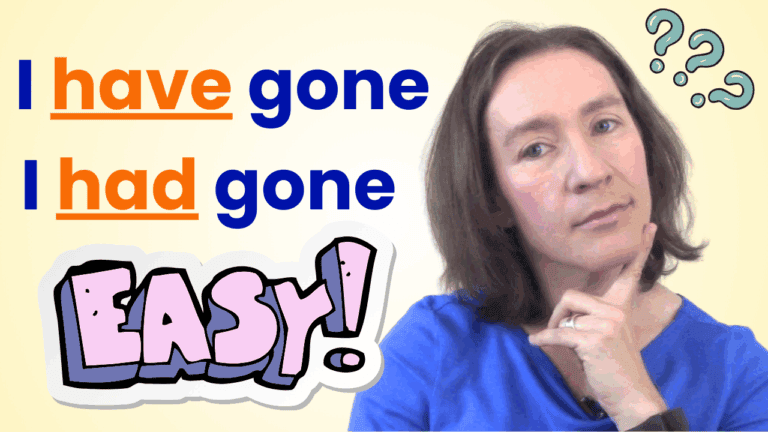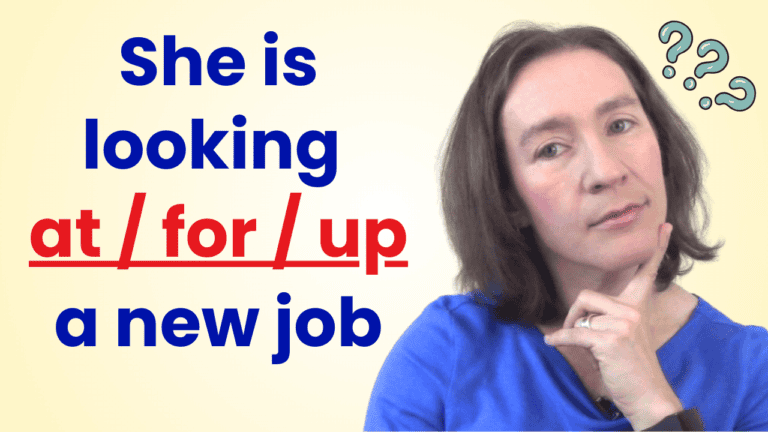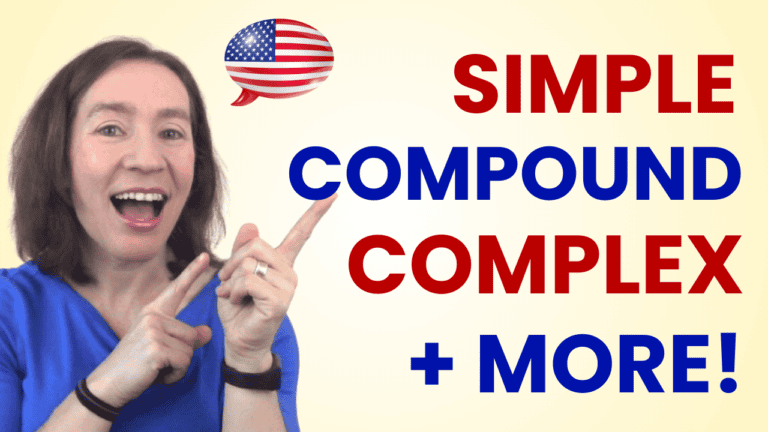
When do we use the first conditional?
We use the first conditional to talk about results of possible future conditions. Here are some example sentences:
- If it’s sunny tomorrow, I’ll go to the beach.
- If it rains tomorrow, I’ll stay home.
- If she studies hard, she will pass the exam.
- If you finish your chores, you can watch TV.
- If we don’t get to the airport on time, we’ll miss our flight.
- If he doesn’t call me soon, I’ll send him a text message.
- If you save money, you’ll be able to afford that new phone.
- If the restaurant isn’t too crowded, we’ll have dinner there tonight.

Parts of a first conditional sentence
There are two parts to a first conditional sentence:
- the condition (sometimes called the “if clause”)
- the result (sometimes called the “main clause”)
| CONDITION | RESULT |
| If you study this weekend, | you’ll pass the test on Monday. |
| If you don’t study, | you’ll fail. |
| If I wake up early enough tomorrow, | I’m going to make a big breakfast. |
| If we don’t save money this year, | we won’t be able to buy Christmas presents. |
It is possible to reverse the condition and the result, with no change in meaning:
- If you don’t study, you’ll fail.
- = You’ll fail if you don’t study.
- If I wake up early enough tomorrow, I’m going to make a big breakfast.
- = I’m going to make a big breakfast if I wake up early enough tomorrow.
Note that when the “if clause” (condition) comes first in the sentence, we use a comma after it. However, when the result comes first in the sentence, then we don’t use a comma between the two clauses.

How to form the first conditional
Pay close attention to the correct verb forms in the condition and result:
CONDITION: if + subject + present simple
- If we go to the party tomorrow,
- If you don’t leave work soon,
- If she gets promoted,
- If he doesn’t read the textbook,
RESULT: subject + simple future (will / won’t, going to / not going to)
- we’ll have a good time.
- you’ll get stuck in rush hour traffic.
- she’s going to earn more money.
- he won’t understand the class.
Even though BOTH events are in the future, we always use the simple present in the condition (“if-clause”).
Avoid the common error of using the simple future in the condition:
If we will go to the party tomorrow, we’ll have a good time.- If we go to the party tomorrow, we’ll have a good time.
If it won’t rain tonight, I’ll go for a walk.- If it doesn’t rain tonight, I’ll go for a walk.
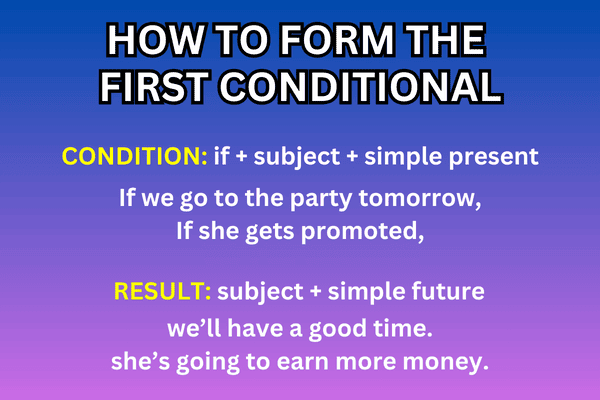
Both the condition and the result can be positive or negative (with “not”):
- If you take the train, you‘ll get there faster.
(positive condition – positive result) - If you don’t take the train, you‘ll have to drive.
(negative condition – positive result) - If you take the train, you won’t get stuck in traffic.
(positive condition – negative result) - If you don’t take the train, you won’t need to buy a train ticket.
(negative condition – negative result)
First Conditional Quiz
Question 1 |
A | isn't driving / won't have |
B | doesn't drive / 'll have |
C | drives / 'll have |
Question 2 |
A | will be / don't forget |
B | is going to be / forget |
C | is / 'll forget |
Question 3 |
A | don't leave / won't |
B | 'll leave / are going to |
C | won't leave / don't |
Question 4 |
A | You learn / won't study |
B | You won't learn / 'll study |
C | You'll learn / study |
Question 5 |
A | 'll buy / it doesn't cost |
B | won't buy / it won't cost |
C | buy / it'll cost |
Question 6 |
A | Won't / aren't hearing |
B | Do / 'll hear |
C | Will / hear |
Question 7 |
A | 'll ask / 'll tell |
B | ask / 'll tell |
C | ask / is telling |
Question 8 |
A | calls / 'm going to tell |
B | will call / tell |
C | calls / won't tell |
Question 9 |
A | won't make / keeps |
B | is going to make / won't keep |
C | doesn't make / 'll keep |
Question 10 |
A | will take / will have |
B | take / won't have |
C | don't take / don't have |
Variations in first conditional sentences
Alternative words to “if” in the condition
It is possible to use other words instead of if in the “condition” part of first conditional sentences:
| ALTERNATIVE TO “IF” | WHY USE IT? | EXAMPLE |
| When | When the “condition” will definitely happen. | When I die, I’ll leave all my money to charity. |
| As soon as | To emphasize immediacy | This situation is very urgent. I’ll call you as soon as I have more information. |
| Unless | In place of “if not” | You’ll fail the test unless you study. = You’ll fail the test if you don’t study. |
Let’s study each case separately.
WHEN: When the “condition” will definitely happen in the future.
Look at the difference between these two sentences:
- If I see Sam, I’ll give him your message. (I’m not sure if I will see him or not)
- When I see Sam, I’ll give him your message. (I will definitely see Sam)
AS SOON AS: To emphasize immediacy.
- My feet hurt! As soon as I get home, I’m going to take off these high heels.
- As soon as we have enough money saved, we’ll take a vacation to Costa Rica. We can’t wait!
- I’ll respond to your e-mail as soon as I can.
UNLESS: Substitute for “if not.”
- You won’t lose any weight unless you start eating healthier food.
= You won’t lose any weight if you don’t start eating healthier food. - I’m not going to dance unless somebody invites me.
= I’m not going to dance if somebody doesn’t invite me. - Unless there’s an emergency at work, I’ll be home on time.
= If there’s not an emergency at work, I’ll be home on time.

Alternative words to will / going to in the result
Instead of will / going to, we can use modal verbs like can, might, could, or should. Compare these two sentences:
- If you go out in the rain, you will get wet.
(100% certain) - If you apply for that university, you might/could be accepted.
(not 100% certain)
Use can in the result of first conditional sentences to give permission / prohibition:
- If you finish your homework, you can watch TV for an hour.
- If you don’t have a ticket, you can’t get into the theater.
Use might/could to express a possibility that is not a certainty:
- If he gets home from work early, we could go for a walk before dinner.
- If you try to lift that heavy weight, you might hurt yourself.
Use should to give advice if the condition happens:
- If your toothache doesn’t get better soon, you should see a dentist.
- If they go to New York next week, they should visit the Statue of Liberty.
First Conditional vs. Other Conditionals
First Conditional vs. Zero Conditional
The zero conditional describes GENERAL truths and facts. Both the condition and result are in the simple present:
- When it rains, the ground gets wet.
(it is a general fact/truth) - If I’m late to school, the teacher always yells at me.
(this ALWAYS happens)
The first conditional describes a specific event that will/might happen in the future IF a future condition happens. The condition is in the simple present tense, and the result is in the simple future tense:
- If it rains tomorrow, I’m going to stay home.
- If I’m late to school today, I’ll miss an important test.
First Conditional vs. Second Conditional and Third Conditional
Both the second conditional and third conditional describe IMAGINARY situations.
In the second conditional, we are imagining the result if the present were different:
- If I were a millionaire, I would buy a sports car.
(but the reality is that I AM NOT a millionaire, so I’m not buying that car)
In the third conditional, we are imagining the result if the past had been different:
- If I had taken the earlier train, I would have gotten to work on time.
(but the reality is that I DID NOT take the earlier train, so I did not get to work on time)
The first conditional describes REAL future results/possibilities that will happen if the condition happens. Compare these conditional sentences:
- First conditional: If I have some free time this weekend, I will read a book.
(it’s a real possibility that I’ll have some free time and read a book) - Second conditional: If I had more free time, I would take dance classes.
(this is just imaginary – the reality is that I don’t have much free time, so I’m not taking dance classes) - Third conditional: If I‘d had more free time yesterday, I would have cleaned the house.
(imaginary – the reality is that I didn’t have free time yesterday, so I didn’t clean the house)
Learn more about the first conditional with this tutorial


